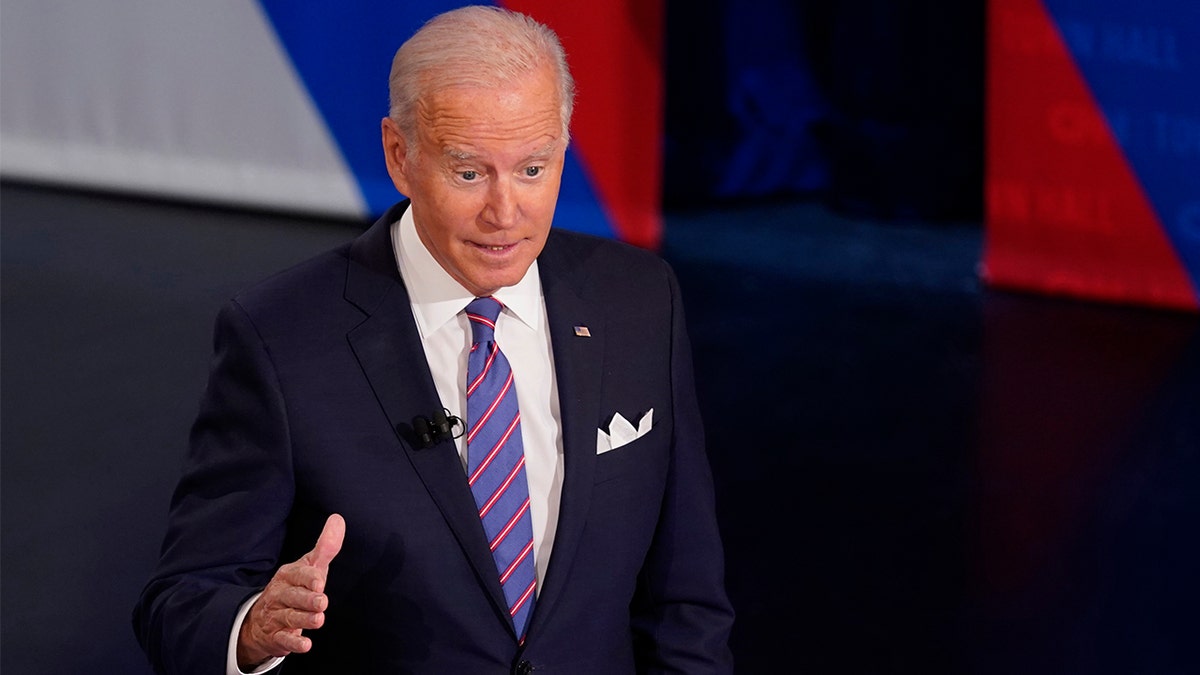Fox News Flash top headlines for October 22
Fox News Flash top headlines are here. Check out what's clicking on Foxnews.com.
The White House clarified a number of statements President Biden made during a live town hall Thursday night, walking back his vow to call in the National Guard to aid the congested supply chain and his suggestion that the United States would defend Taiwan from a potential attack from China.
The White House told Fox News on Friday that "requesting the use of the national guard at the state level is under the purview of Governors."
AFTER BIDEN SAYS US WOULD DEFEND TAIWAN FROM ATTACK, CHINA SAYS THERE'S 'NO ROOM FOR COMPROMISE'
"We are not actively pursuing the use of the national guard on a federal level," a White House official told Fox News.
The clarification came after the president, during a CNN town hall hosted by Anderson Cooper Thursday night, was asked if he would consider having National Guardsmen drive trucks to make up for the lack of truck drivers amid the fallout from the coronavirus pandemic.

President Biden participates in a CNN town hall at the Baltimore Center Stage Pearlstone Theater, Thursday, Oct. 21, 2021, in Baltimore. (AP Photo/Evan Vucci) (AP Photo/Evan Vucci)
Biden said he would, and that he had a timetable to solve the crisis.
"I had a timetable for, first of all, I want to get the ports up and running," the president said, noting the commitments he had from Walmart and other companies, like UPS and FedEx, to run 24/7 operations to help quell the congested supply chain.
When pressed further on whether he would want the National Guard to drive trucks, the president replied: "The answer is yes, if we can't move to increase the number of truckers, which we're in the process of doing."
Shifting to foreign policy, the president was asked by a member of the audience about China’s recent testing of a hypersonic missile and questioned him about whether the United States would defend Taiwan in the wake of an attack from Beijing.
"China, Russia, and the rest of the world knows we have the most powerful military in the history of the world. Don't worry about whether we're going to – they're going to be more powerful," Biden said in the CNN town hall. "What you do have to worry about is whether or not they're going to engage in activities that will put them in a position where they may make a serious mistake."
Biden added that he does "not want a Cold War with China."
"I just want to make China understand that we are not going to step back, we are not going to change any of our views," Biden said.
Cooper chimed in, pressing again on whether the U.S. would defend Taiwan from a Chinese attack, to which Biden replied: "Yes, we have a commitment to do that."
By Friday morning, a Chinese foreign ministry spokesperson responded to the comment via the Chinese state-affiliated Global Times.
"No one should underestimate the strong resolve, determination and capability of the Chinese people to safeguard national sovereignty and territorial integrity," the spokesperson said, according to the mouthpiece for the brutal communist regime. "China has no room for compromise."
WHITE HOUSE WALKS BACK BIDEN VOW TO USE NATIONAL GUARD TO UNTANGLE SUPPLY CHAIN
The Global Times added that China's foreign ministry told the U.S. to "be cautious in words and deeds" and to "refrain from sending any wrong signal to secessionists."
But a White House spokesperson on Friday told Fox News that the president "was not announcing any change in our policy."
"There is no change in our policy," the spokesperson told Fox News. "The U.S. defense relationship with Taiwan is guided by the Taiwan Relations Act."
"We will uphold our commitment under the Act, we will continue to support Taiwan's self-defense, and we will continue to oppose any unilateral changes to the status quo," the spokesperson added.
The Taiwan Relations Act to which the United States is a party does not guarantee the U.S. will engage militarily if China attacks Taiwan, which it has claimed for decades is sovereign Chinese territory, but states that the United States "will make available to Taiwan such defense articles and defense services in such quantity as may be necessary to enable Taiwan to maintain self-sufficient defense capabilities."
U.S. presidents have pursued a policy of "strategic ambiguity" so that China would not know exactly what the U.S. response would be to an attack.
Beijing views Taiwan as a breakaway province and claims that it is part of its own territory. The two countries split in 1949, and China has been increasing pressure on the self-ruled nation while opposing its involvement in international organizations such as the United Nations. The U.S. does not formally recognize Taiwan but maintains an unofficial relationship and is supportive of its democratic government.
The Biden administration has aimed to compartmentalize its relationship with China – competing in some respects while seeking cooperation on other issues, like climate change. But it has made clear for months that the United States will defend Taiwan, which is a democratic island off the coast of China.
CLICK HERE TO GET THE FOX NEWS APP
"We have an abiding interest in peace and stability across the Taiwan Strait. We consider this central to the security and stability of the broader Indo-Pacific region," a senior administration official told Fox News in August as China aimed to seize on the Afghanistan withdrawal to intimidate Taiwan.
"We will uphold our commitment under [Taiwan Relations Act], we will continue support Taiwan’s self-defense, and we will continue to oppose any unilateral changes to the status quo," the official said.















































